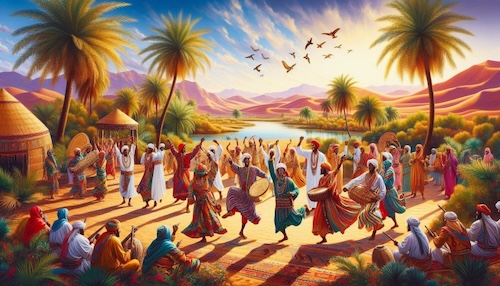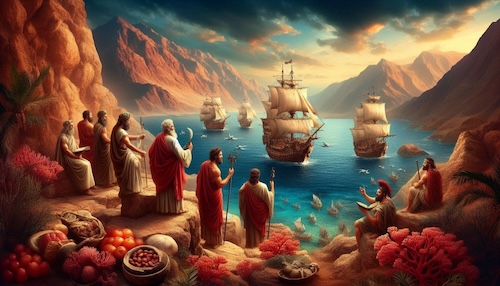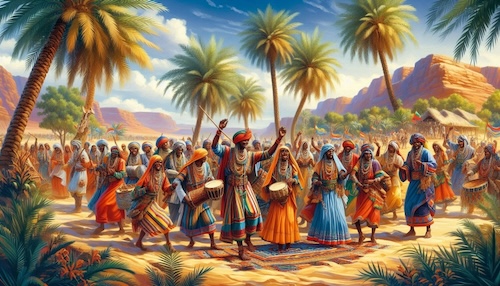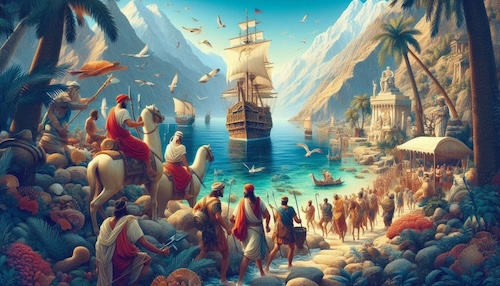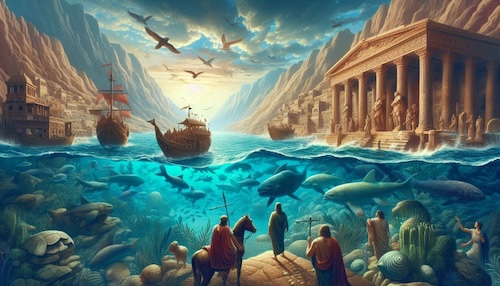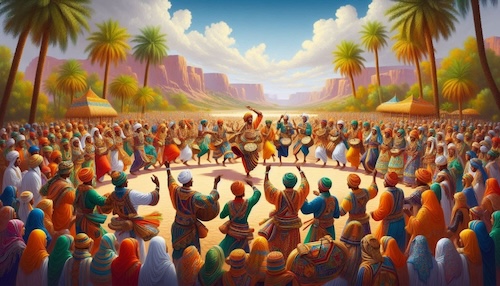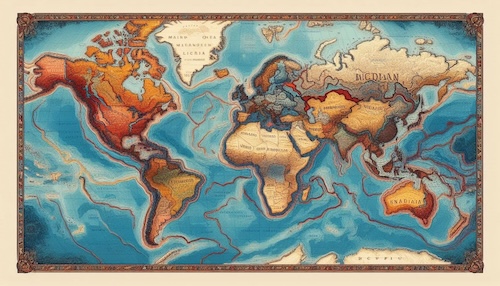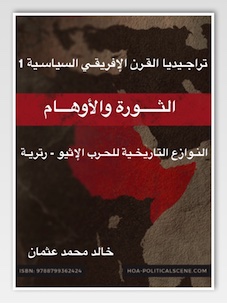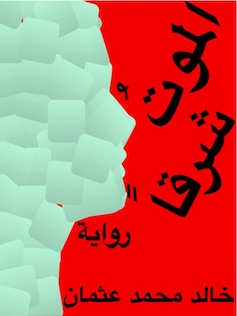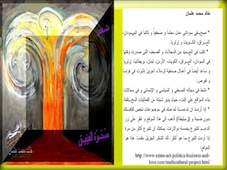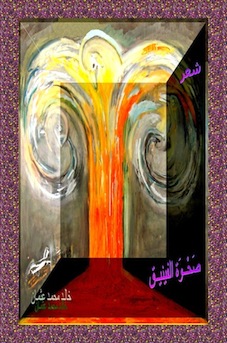Eritrea Was Too Late to Independence Due to Colonial Conspiracies!
Eritrea Was Too Late to Independence Due to Colonial Conspiracies is not a claim. It is a solid fact that is documented well in my book on the Horn of Africa, after reading many books, especially immediately after the independence and rethinking historical events, checking them against each other, some of which I got from my resources and checking them against what each writer in the subject has written.
Its struggle for independence was notably delayed compared to other African nations, largely due to colonial conspiracies and strategic annexation by external forces. Drawing parallels to Namibia’s liberation, Eritrea’s fight was shaped by the same historical forces that delayed freedom in other African states.
The impact of colonial rule in the colonization era, Cold War-era geopolitical interests, and post-Cold War transitions all played a role in shaping its eventual sovereignty. Examining Eritrea’s experience alongside Namibia’s provides crucial insights into how international politics influenced independence movements across Africa.
So, inspired by the interconnectivity of historical eras and specially when the American administration came with difficult shift in its economical policies presenting Trump's Tariffs, which has created Trade Wars, I decided to explore these eras again to examine this connectivity of economical, geopolitical and ideological shifts that impact other nations in the world. The result of this search is a comprehensive topics that are covered in the following pages, all of which connect history with present days:
The interconnected pages
- Why Expanding Horn Africa to Include Other States and Global Impacts?
- A New Era of Chaos and Distrust is Shaping!
- Pre-Cold War Era of Colonialism & Imperial Rivalries!
- Pre-Cold War American Expansionism!
- The Cold War Era: A Battle of Ideologies and Influence!
- Why Do Nations Fragment When Unity is Their Greatest Strength?
- Eastern Europe Socialist Bloc Fragmentation!
- The Sudanese Muslim Brothers and the U.S. have Created International Terrorism!
- Eritrea Was Too Late to Independence Due to Colonial Conspiracies!
- Namibian Road to Independence From Liberation to Sovereignty!
- The Post-Cold War Era: A Shifting Global Landscape!
- How Economics, Ideology, and Geopolitics Fragment Nations and Create New Ones?
- New World Order: Stability or Chaos?
- Why Am I Saying A New Era of Disorder and Doubts is Shaping?
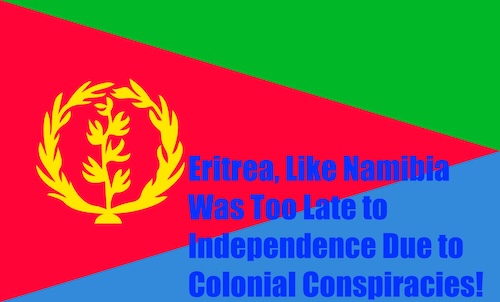 Eritrea Was Too Late to Independence Due to Colonial Conspiracies: Eritrean flag with a title of this page in the first phrase.
Eritrea Was Too Late to Independence Due to Colonial Conspiracies: Eritrean flag with a title of this page in the first phrase.Brief Historical Background: The Earliest Evidence of Eritrea in Red Sea History!
This is about Eritrea’s Historical Significance Before Other Nations in the Red Sea! Most of the world does not know that "Eritrea Was Too Late to Independence Due to Colonial Conspiracies". It appears to me that has happened because of ideological orientation worldwide that favoured the regional imperialism, which was Ethiopia... the closest system in this area in the Horn of Africa to the colonising powers, except of course the Italian colonization.
Before the formation of the recent states in the Horn of Africa, the area where Eritrea is located now has been known by the Greek explorers who arrived at the Red Sea and considered it with the other lands beyond the sea the land of the burned skins. Given the historical connections between Greek explorers, traders, and the Red Sea region, it wouldn't be surprising if an ancient Greek name resembled "Eritrea." The name Erythraean comes from the Greek word Erythros, meaning red, which could be tied to the historical naming of Eritrea with its Red Sea.
It’s possible that what you read referred to the Erythraean Sea, which ancient Greek geographers used to describe the waters around the Horn of Africa and Arabian Peninsula. Some Greek sources mention Erythraea as a broader region rather than a specific island.
The Greek naming of the Erythraean Sea and their descriptions of the people in the region reflect the early interactions between Mediterranean civilizations and the communities along the Red Sea. Ancient Greek writers like Agatharchides and Strabo recorded observations about the people in the Horn of Africa, often through the lens of traders and explorers who ventured into these waters.
The reference to “people of burned skins” aligns with historical descriptions in Greek and Roman texts, which often characterized populations based on geographic and climatic influences. These writings reveal not just how Europeans perceived the region but also how trade, migration, and empire-building shaped historical narratives.
So, here are key-factors before the creation of states in the Horn of Africa:
When the Ancient Greeks arrived in the area via the Red Sea before it was known by that name they described the local inhabitants as *people with burned skin* and named the sea *Erythraean*, which later translated to *Red Sea*.
Colonial powers divided tribal communities between two countries through their territorial agreements, creating a future landscape of disputes and conflicts. This division fueled tribal tensions, disrupting established structures and creating long-term instability essentially a time bomb that shaped the destiny of the region.
Beja of Eritrea: are an ethnic Cushitic group consisting of nomadic shepherds, commonly referred to as Tigre.
Beja of Sudan: are also an ethnic Cushitic group in Sudan, consisting of nomadic shepherds, who are also called Beni-Amer tribes. They are not ancient Egyptians but rather indigenous to Eritrea and Sudan. They inhabited the region long before the name *Egypt* existed.
Some mistakenly refer to the Beja as "Bedouin Arabs of Sudan", though they are not Arabs. They are Hamitic people, descending from Ham... one of Noah’s three sons, while Japheth and Shem represent other historical lineages, with Shem being the ancestor of Semitic peoples.
Referring to them by that Arabic description indicates that they relied on the Arabic alienation given to Beja as Beni-Aamer. That’s a crucial observation! The association of the Beni-Amer name with Arabic lineage reinforces the misconception that the Beja people are Arabs, rather than Cushitic. Northern Sudan’s educational and governmental narratives have played a major role in shaping this perception, often merging ethnic identities under broader Arab classifications.
It’s noteworthy how historical misinterpretations, whether through colonial divisions, political ideologies, or nationalistic frameworks can reshape identity over generations. The Beja’s true Cushitic heritage remains distinct, despite these external influences.
The Instinct and Intuition of the Italians:
The Italian colonization power realised these facts to know Eritrea as a different land from Ethiopia and from Sudan, although some of the nationalities are shared between these countries. The Italian colonialists have favourited it, when they built the capital of Asmara somewhat similar to Rome and called it little Rome and then the Italian king issued his decree on the first of January, 1890 creating Eritrea as an official state.
Some colonising powers, except for the Italian colonization empowered the imperial system of the Ethiopian emperor Manlike and after him Haile Selassie, helping him to get rid of competitors like Mohammed Ali and His son Iyaso, although Iyaso was the legitimate inheritance of Manlike. There are more insights about this in my book, getting back to the Italian confrontation with the Tigris empror Yohannes before Manlike.
The French colonial power specifically cooperated with Manlike and Haile Selassie to strengthen Ethiopia's effective presence in the Horn of Africa, open the way to the Red Sea for her and even discussing the possibilities of giving him Djibouti. You know the proverb that goes like "Birds of feather flog together". That works also in politics.
Eritrea Was Too Late to Independence Due to Colonial Conspiracies with Haile Selassie!
Through a comprehensive research I have taken across nearly 100 books and documentaries, I found that Eritrea’s delayed independence due to colonial conspiracies remains largely unacknowledged. My book presents the evidence missing from mainstream discussions.
As a close journalist to the Eritrean People's Libration Front (EPLF), since the early days of the Eritrea national liberation struggle and the author of "The Political Tragedy of the Horn of Africa", I published later, I know many facts about all of the consequences of the Eritrean national struggle for independence since the 1940s.
While many nations achieved independence from colonial rule in the mid-20th century, Eritrea and Namibia remained embroiled in prolonged struggles that culminated in their liberation in 1990-1991. Through this liberation struggle Eritrea lost 500,000 of its liberation fighters.
Notably, Eritrea’s fight for sovereignty was not a direct break from European imperialism but from Ethiopia’s internal political system. Initially annexed by Haile Selassie’s government, Eritrea later found itself under the rule of Mengistu Haile Mariam and his Derg military regime, which framed itself as a communist authority.
Haile Selassie is the Christian name that was chosen for Tafari Makonnen, a name which is also written as Teferi Mekonnen, who was in the rank of "Ras" that time. The French press has highlighted him impressively as an emperor even before assuming that position.
The Eritrean People’s Liberation Front (EPLF), alongside the Tigrayan People's Liberation Front (TPLF), led a coordinated efforts to dismantle the Derg regime, fighting from different fields until the two fronts entered Addis Ababa.
Their combined struggle resulted in Mengistu’s defeat, forcing his army to flee into Sudan and leading to the collapse of his government. Eritrea subsequently declared its independence, marking the end of one of Africa’s longest liberation movements.
* Eritrea was too late to independence because of international colonial conspiracies that has planned with the Ethiopian Emperor Haile Selassie to stop its independence during the 1940th. The conspiracies ended by annexing it to Ethiopia.
To read about this and so many other articles about Eritrea head over to the Eritrean Dynamics in one of the site maps of HOA. To read the political insights on Ethiopia, get to the Ethiopian Dynamics. Follow the linked words.
Eritrea: The Colony Italy Loved, But Couldn’t Keep!
In this historical subject I'll explore Eritrea's colonial identity, Italy's deep attachment to the territory, and the geopolitical struggles that influenced its fate.
Eritrea’s path to independence was shaped by forces far beyond its borders, caught in a colonial struggle that saw Italy fiercely defend its claim while global power dynamics ultimately favored Ethiopia’s annexation efforts. The deep imprint of Italian rule on Eritrea, particularly in Asmara, is evident even today... echoing an era where Italian ambitions sought to mold the colony into an extension of Rome itself.
A Colony Like No Other
Unlike other colonial holdings that European powers viewed as mere assets to extract wealth from, Eritrea held a special place in Italy’s imperial imagination. Italian settlers romanticized Asmara as a miniature Rome, with its elegant architecture, grand boulevards, and well-planned streets... something far removed from the haphazard designs seen in other colonies. For Italy, Eritrea wasn’t just a colonial possession; it was a beloved project, where modernity and European influence flourished.
War and Political Bargaining
Italy’s stronghold over Eritrea wasn’t without opposition. Ethiopian emperors eyed the region with increasing ambition, viewing its proximity to their territory as justification for eventual annexation. When Italy clashed with Emperor Menelik II during the First Italo-Ethiopian War (1895-1896), the battle wasn’t just about territory. It was about legitimacy in the eyes of European powers. Despite Italy’s defeat at Adwa, colonial rule in Eritrea remained intact, with Italy doubling down on its claim and reinforcing Eritrea’s distinction from Ethiopia.
Meanwhile, Western powers played a decisive role in shaping Eritrea’s future. While Italy fought to maintain control, geopolitical interests shifted toward supporting an expanded Ethiopian state. Agreements with colonial authorities, including Britain, favored Ethiopia’s territorial claims... setting the stage for Eritrea’s eventual annexation in the mid-20th century.
The Long Road to Independence
By the time Eritrea was officially federated with Ethiopia in 1952, the Italian dream of Eritrea as a standalone colony had already faded. Global post-war negotiations, regional diplomacy, and shifting alliances sealed Eritrea’s fate. What followed was decades of struggle, as Eritreans resisted Ethiopian rule, culminating in a hard-fought independence movement that finally succeeded in 1993.
Yet, the Italian era remains deeply woven into Eritrea’s identity. Asmara’s architecture, culture, and even certain traditions bear unmistakable marks of its colonial past, reminders of a time when Eritrea was not merely another colony, but a cherished piece of Italy’s imperial vision.
What Role Did Eritrea Play in Italian Colonial Policy?
Eritrea played a crucial role in Italy’s colonial ambitions, serving as its first official colony and a strategic base for expansion in the Horn of Africa. Italy formally established the Colony of Eritrea in 1890, after acquiring the port of Assab in 1869..
Strategic Importance
Eritrea’s location on the Red Sea made it a valuable asset for Italy, providing access to maritime trade routes and positioning Italy as a colonial power in Africa. The opening of the Suez Canal in 1869 further increased Eritrea’s significance, as European nations sought control over key ports in the region.
Military & Expansionist Role
Eritrea became a **launchpad for Italy’s invasion of Ethiopia in 1935-36, as Mussolini sought to expand Italian East Africa. The colony provided logistical support, infrastructure, and a trained military force, including Eritrean **ascari** (local soldiers recruited by the Italians).
Economic & Social Policies
Italy invested heavily in Eritrea’s infrastructure, developing Asmara into a modern city with European-style architecture. However, colonial policies favored Italian settlers, limiting opportunities for Eritreans and reinforcing racial hierarchies.
End of Italian Rule
Italy’s control over Eritrea ended in 1941, when British forces occupied the colony during World War II. Eritrea was later federated with Ethiopia in 1952, leading to decades of struggle before achieving independence in 1991.
Eritrea’s colonial past continues to shape its identity, with Italian influences still visible in its architecture, cuisine, and cultural traditions. Would you like to explore how Eritrea’s colonial legacy impacts its modern-day society?
How Did Other Colonial Powers Influence the Situations in Eritrea?
Eritrea’s colonial history is often associated with Italian rule, but the country’s fate was also shaped by the interests and interventions of other colonial powers. Britain, France, and the Ottoman Empire all played roles,whether directly or indirectly, in influencing Eritrea’s political, economic, and social landscape. Their involvement contributed to the shifting dynamics that ultimately led to Eritrea’s annexation by Ethiopia and its long struggle for independence.
The Ottoman Empire: Early Colonial Influence
Before European colonialism took hold, the Ottoman Empire exerted control over parts of Eritrea, particularly the coastal regions. The Ottomans ruled Massawa and surrounding areas from the 16th century, using the port as a strategic trade hub. While their influence was limited inland, Ottoman rule introduced Islamic traditions and trade networks that connected Eritrea to the broader Red Sea economy.
British Occupation: A Temporary Custodian
Following Italy’s defeat in World War II, Britain took control of Eritrea in 1941, administering it as a military occupation rather than a formal colony. British rule was marked by economic exploitation, as Eritrean industries were dismantled and resources redirected to support British interests elsewhere. The British also played a pivotal role in shaping Eritrea’s political future, as they favored Ethiopian annexation over Eritrean independence.
French Interests: Regional Rivalries
France, though never a direct colonial ruler of Eritrea, had a vested interest in the region due to its control over neighboring Djibouti. French colonial authorities viewed Eritrea as a competitor to Djibouti’s strategic importance, particularly in trade and naval operations. As a result, France supported Ethiopia’s territorial ambitions, aligning with British policies that ultimately led to Eritrea’s federation with Ethiopia in 1952.
The Role of International Agreements
The fate of Eritrea was heavily influenced by colonial-era agreements and diplomatic maneuvering. Western powers, including Britain and France, saw Ethiopia as a more stable ally in the region and backed its claims over Eritrea. This led to Eritrea’s forced federation with Ethiopia, setting the stage for decades of resistance and eventual independence in 1991.
Conclusion: A Legacy of Colonial Interference
Eritrea’s struggle for sovereignty was not just a battle against Ethiopian annexation but also a consequence of colonial powers shaping its destiny. The Ottomans, British, and French each played roles in influencing Eritrea’s political and economic trajectory, often prioritizing their own interests over Eritrean self-determination. Today, Eritrea’s resilience stands as a testament to its ability to overcome external interference and forge its own path.
Why Did the Ethiopian Emperor Wage War Against the Italians in Eritrea?
The conflict between Ethiopia and Italy over Eritrea was deeply rooted in colonial ambitions, territorial disputes, and the struggle for sovereignty. Ethiopian emperors viewed Italian expansion as a direct threat to their nation’s independence, leading to multiple wars that shaped the region’s history.
The Treaty of Wuchale: A Disputed Agreement
One of the key triggers of war was the Treaty of Wuchale, signed in *1889 between Emperor Menelik II and Italy. The treaty was meant to establish diplomatic relations, but conflicting interpretations led to tensions. The Amharic version of the treaty recognized Italy’s presence in Eritrea while maintaining Ethiopia’s sovereignty. However, the Italian version implied that Ethiopia had become an Italian protectorate.
When Menelik II discovered this discrepancy, he rejected Italy’s claims and sought to defend Ethiopia’s independence, setting the stage for war.
The First Italo-Ethiopian War (1895-1896)
Italy, eager to expand its colonial holdings, launched an invasion from Eritrea in 1895 The Ethiopian emperor mobilized a massive army, uniting various regional forces to resist Italian aggression. The war culminated in the Battle of Adwa in 1896, where Ethiopian forces decisively defeated the Italians. This victory was historic, as it marked one of the few instances where an African nation successfully repelled European colonization.
Eritrea’s Role in Italian Expansion
Eritrea was Italy’s first formal colony, established in 1890. The Italians viewed Eritrea as a strategic base for further expansion into Ethiopia. They built infrastructure, recruited local soldiers (ascari), and attempted to use Eritrea as a launching point for their military campaigns. Ethiopian emperors saw this as a direct threat, prompting them to resist Italian influence in the region.
The Second Italo-Ethiopian War (1935-1937)
Decades later, Italy, under *Benito Mussolini, sought revenge for its earlier defeat. In 1935, Italy invaded Ethiopia again, using Eritrea as a staging ground. This time, Ethiopia was unable to resist the superior firepower of the Italian military, leading to its occupation in 1936. Emperor Haile Selassie was forced into exile, though Ethiopian resistance continued until Italy’s defeat in 1941 during World War II.
Conclusion: A Fight for Sovereignty
The Ethiopian emperors waged war against Italy in Eritrea to protect their nation’s sovereignty and resist colonial domination. The conflicts over Eritrea were not just territorial disputes but battles for independence, shaping Ethiopia’s legacy as one of the few African nations to successfully resist European colonization.
What are The Strategic Pointers that Italian Has Been Defeated?
Italy faced several strategic defeats throughout history, particularly in World War II and its colonial conflicts. There are some key factors that contributed to its losses:
1. The Battle of Adwa (1896) – Defeat in Ethiopia
- Italy underestimated Ethiopian forces and suffered a major defeat at Adwa, marking one of the few successful African resistances against European colonization.
- Poor logistics and miscalculations led to Italy’s failure to expand its control over Ethiopia.
2. The Italian Campaign (1943-1945) – WWII Defeat
- The Allied invasion of Sicily (1943) weakened Italy’s defenses and led to Mussolini’s downfall.
- Italy’s surrender in September 1943 resulted in German occupation, turning Italy into a battleground between Axis and Allied forces.
- The Battle of Monte Cassino (1944) and the final push into Northern Italy led to Italy’s complete liberation in May 1945.
3. The Second Italo-Ethiopian War (1935-1941) – Loss of East Africa
- Italy initially occupied Ethiopia in 1936, but Ethiopian resistance continued.
- British forces launched a counteroffensive in 1941, liberating Ethiopia and ending Italian rule in East Africa.
4. Weak Military Strategy & Overextension
- Italy’s military was under-equipped compared to other European powers.
- Overextension in multiple fronts (North Africa, Balkans, and Russia) led to resource depletion and strategic failures.
How Was Eritrea Too Late to Independence and Why was That Due to Colonial Conspiracies?
This is a history unfolded, yet... until I explored it thoroughly in my political book on the area. Some of the insights are scattered here on the HOA Political Scene. But, you can collect them easily to read on the linked pages. Check the related pages below:
Eritrean Articles Highlight How Was Eritrea Too Late to Independence Due to Colonial Conspiracies: Space Exploration: A Double-Edged Sword? [Latest on The Insight Lens: Wednesday, May 07, 2025] Support me here Follow the Insight Lens
Eritrean Articles Highlight How Was Eritrea Too Late to Independence Due to Colonial Conspiracies: Space Wars: The Next Frontier! [Latest on The Insight Lens: Thursday, May 08, 2025]
Eritrean Articles Highlight How Was Eritrea Too Late to Independence Due to Colonial Conspiracies: Are We Repeating Colonial Mistakes in Space? [Latest on The Insight Lens: Thursday, May 08, 2025]
Eritrean Articles Highlight How Was Eritrea Too Late to Independence Due to Colonial Conspiracies: From Colonial Empires to Space Frontiers: Lessons Unlearned [Latest on The Insight Lens: May 9, 2025]
Eritrean Articles Highlight How Was Eritrea Too Late to Independence Due to Colonial Conspiracies: The Hidden Dangers of Space Exploration: Are We Going Too Far? [Latest on The Insight Lens: May 10, 2025]
Eritrean Articles Highlight How Was Eritrea Too Late to Independence Due to Colonial Conspiracies: Climate Change: Myths vs. Reality! [Latest on The Insight Lens: Monday, May 05, 2025]
Eritrean Articles Highlight How Was Eritrea Too Late to Independence Due to Colonial Conspiracies: How Trump’s Tariffs Led to Price Hikes & Consumer Resistance? [The Insight Lens]
Eritrean Articles Highlight How Was Eritrea Too Late to Independence Due to Colonial Conspiracies: The Age of Gold: How Trade Wars and Economic Policies Shape the Future? [Latest on The Insight Lens: 2025-04-25]
Eritrean Articles Highlight How Was Eritrea Too Late to Independence Due to Colonial Conspiracies: Robots Delivering Breaking News: Today's Global Highlights! [The Insight Lens: 2025-04-25]
Eritrean Articles Highlight How Was Eritrea Too Late to Independence Due to Colonial Conspiracies: The World is Heating Amid Trade Wars – A Crisis Ignored! [Latest on The Insight Lens: 2025-04-24]
Eritrean Articles Highlight How Was Eritrea Too Late to Independence Due to Colonial Conspiracies: Robot Anchor Reports: Trade War Tensions & Market Reactions! [Latest on The Insight Lens: 2025-04-23]
Eritrean Articles Highlight How Was Eritrea Too Late to Independence Due to Colonial Conspiracies: Robot Anchor Reports: U.S. Trade War & Gold Surge! [Latest on The Insight Lens: 2025-04-22]
Eritrean Articles Highlight How Was Eritrea Too Late to Independence Due to Colonial Conspiracies: Humanoid Robots Report on Trade Wars: The Global Economic Showdown [Latest on The Insight Lens: 2025-04-22]
What Do You Think About "Eritrea Was Too Late to Independence Due to Colonial Conspiracies"?
I am thinking of that you might have different thoughts while reading "Eritrea Was Too Late to Independence Due to Colonial Conspiracies". Different opinions are always better for different discussions, until they align with each other. This is a free not censored discussion. So, feel free to let me know what you think of "Eritrea Was Too Late to Independence Due to Colonial Conspiracies". I am open to your opinions.
Have A Great Story About This Topic?
Do you have a great story about this? Share it!
Did you get any of my books from Apple Books?
Click here to tell me & get some free books. Fill the form.
رواية "الموتُ شرقاً" تكشف لك سرّ الموت الشرقي التراجيدي المستمر للإنسان
احصل علي الرواية الآن واكتشف إنهيار القواسم المشتركة، واستلهم إبداعا يشبه الأسطورة في النص الروائي
"Follow", "like", "tweet", or "pin" the pictures to express your love! Thanks
TweetHorn Africa's Political Tragedy
Love in the Internet Time on Apple Books
Rising of the Phoenix Poetry on Apple Books
Free Poetry Picture Book
Free poetry picture book on Apple Books. You can use the images on public places for your customers to enjoy, while taking coffee.
The French & Spanish Versions
You can work the French versions and the Spanish versions of the two books above with me on, one on one bases. Contact Us.
HOAs Political Poetry Imaged
I'll be thankful, if you get one of my books.
My Books!
Publish Your BookLet's be the publishers of your book. Use the form at Contact Us.


